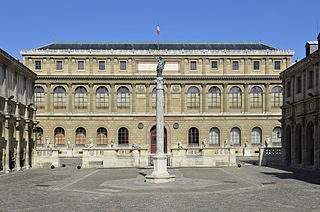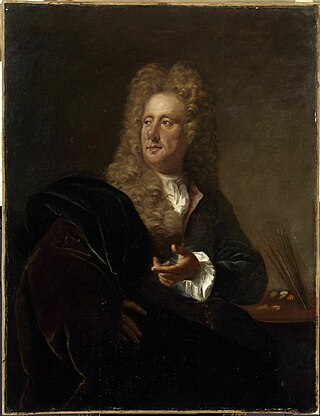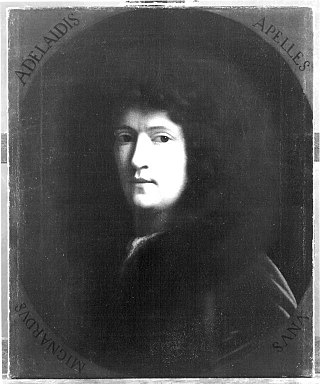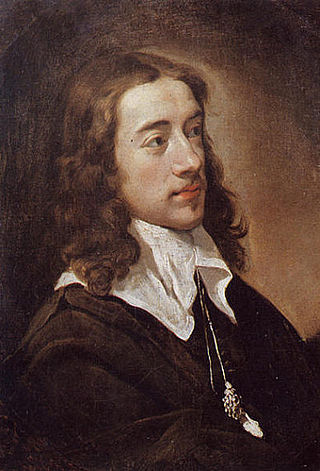

Louis Licherie de Beurie (6 July 1629, Nesle-Hodeng - 3 December 1687, Paris) was a French painter and engraver in the Baroque style. He specialized in Biblical and historical scenes.


Louis Licherie de Beurie (6 July 1629, Nesle-Hodeng - 3 December 1687, Paris) was a French painter and engraver in the Baroque style. He specialized in Biblical and historical scenes.
He was originally a student of Louis Boullogne. In 1666, he found employment as a member of the workshop of Charles Le Brun, the Premier peintre du Roi, who was responsible for all the grand decorations created during the reign of King Louis XIV. The following year, he was appointed Director of the drawing and design school at the Gobelins Manufactory, whose Chief Director was Le Brun. He held that position until 1670.
He became a member of the Académie royale de peinture et de sculpture in 1679. His reception piece was a scene depicting Abigail bringing gifts to King David, which is now preserved at the École nationale supérieure des Beaux-Arts. In 1681, he was named an Assistant Professor.
Many of his works were created for religious institutions, notably at Saint-Germain l'Auxerrois and the Chartreuse de Bourgfontaine . The catalog of his known works has grown considerably due to recent research.
His works may be seen at the Louvre, the Musée des beaux-arts de Nantes, Musée des beaux-arts de Rouen, Musée Thomas-Henry, Musée Magnin and at the Musée de la Grande Chartreuse . [1] [2]

Jacint Rigau-Ros i Serra, known in French as Hyacinthe Rigaud, was a Spanish-French baroque painter most famous for his portraits of Louis XIV and other members of the French nobility.

Charles Le Brun was a French painter, physiognomist, art theorist, and a director of several art schools of his time. He served as a court painter to Louis XIV, who declared him "the greatest French artist of all time". Le Brun was a dominant figure in 17th-century French art and was influenced by Nicolas Poussin.

The Académie royale de peinture et de sculpture was founded in 1648 in Paris, France. It was the premier art institution of France during the latter part of the Ancien Régime until it was abolished in 1793 during the French Revolution. It included most of the important painters and sculptors, maintained almost total control of teaching and exhibitions, and afforded its members preference in royal commissions.

The Beaux-Arts de Paris, formally the École nationale supérieure des beaux-arts, is a French grande école whose primary mission is to provide high-level fine arts education and training. The art school, which is part of the Paris Sciences et Lettres University, is located on two sites: Saint-Germain-des-Prés in Paris, and Saint-Ouen.

Jean-Baptiste Jouvenet was a French painter, especially of religious subjects.

Nicolas de Largillière was a French painter and draughtsman.

Pierre Mignard or Pierre Mignard I, called "Mignard le Romain" to distinguish him from his brother Nicolas Mignard, was a French painter known for his religious and mythological scenes and portraits. He was a near-contemporary of the Premier Peintre du Roi Charles Le Brun with whom he engaged in a bitter, life-long rivalry.

Charles de La Fosse was a French painter born in Paris.

Claude Lefèbvre was a French painter and engraver.

Jean-Joseph Taillasson was a French history painter and portraitist, draftsman, and art critic.

Jean-Baptiste Marie Pierre was a French painter, draughtsman and administrator.

Pierre Granier was a proficient but minor French sculptor, trained in the excellent atelier of François Girardon who produced a generation of highly competent sculptors for the Bâtiments du Roi. Granier served as a modest member of the extensive team that provided sculpture for the Château de Versailles and its gardens. Strict control over the subjects, scale, materials and to a great extent the design of sculpture for Versailles was exercised by the premier peintre du Roi, Charles Le Brun. According to Antoine-Nicolas Dézallier d'Argenville, Le Brun provided a wax model for Granier's marble group Ino and Melicertes, and a Shepherdess was sculpted after a sketch given by Le Brun.
Henri Testelin (1616–1695) was a French painter and writer on art.

Pierre-Jacques Cazes was a French painter who specialized in religious and mythological subjects. He also taught several other French artists including François Boucher and Jean-Siméon Chardin.

Pieter van Mol or Peter van Mol was a Flemish painter known for his history paintings of religious subject matter, and to a lesser extent for his allegorical compositions, genre scenes and portraits. His style was profoundly influenced by Rubens, Abraham Janssens and Artus Wolffort. He was court painter to the King and Queen of France.

Pierre-Antoine Demachy was a French artist who specialized in painting ruins, Trompe-l'œil architectural decorations and imaginative scenes of Paris.

Paul Mignard was a French painter and etcher. Born into an important artistic family with its origins in Troyes, he is known mainly as a portrait painter.

Louis Testelin (1615-1655) was a French painter.

Michel-Barthélémy Ollivier was a French painter and engraver. He specialized in historical and genre scenes.
Georges Focus was a French engraver and painter who was born around 1639–1641 in Châteaudun and died on February 26 1708 in Paris. André Félibien calls him "Georges Faucus". He was a member of the Académie royale de peinture et de sculpture, close to Charles Le Brun and Girard Audran. He is famous for the drawings he made while suffering from psychiatric troubles.
![]() Media related to Louis Licherie at Wikimedia Commons
Media related to Louis Licherie at Wikimedia Commons